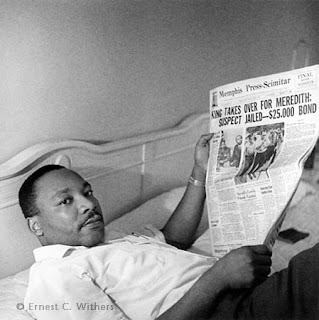A Dream As Yet Unfulfilled
This photograph of Martin Luther King, Jr. hangs in my bedroom in Brooklyn. Beyond liking the composition of the shot, I chose the photo for a couple of reasons. First, I was attracted to the intimacy of the image. It does not capture King making a speech or leading a demonstration or meeting with world leaders, but rather hanging out in a hotel room reading the newspaper. For me, this is a reminder of King’s basic humanity; he was, at the end of the day, a normal person called to perform extraordinary deeds.
I also chose the photo for its historical significance. King is pictured on the cusp of a major civil rights event: a march across the breadth of Mississippi that he undertook in 1966 after James Meredith (the man responsible for integrating the University of Mississippi) was shot by a would-be assassin.
The Meredith March Against Fear was the subject of my college thesis, which argued that the demonstration was a pivotal event in the history of the civil rights movement – the moment when things began to fall apart. Stokely Carmichael’s use of the slogan “black power” along the course of the march made national news, helping to expose a fault line between militant civil rights groups and those who were more interested in working with and within existing American institutions.
In many ways, Martin Luther King, Jr. was caught in the middle of this conflict. King was both a radical and a moderate. He was a fierce critic of American engagement in Vietnam and economic inequality at home. At the same time, he never wavered from his commitment to non-violence and what he called “Negro-White unity.” In my thesis, I wrote this:
King’s ability to avoid a retreat into bitterness and despair is testimony to the power of his idealism. Throughout his life, King was motivated, in large part, by a sense of the possibilities of American democracy. He dreamed of creating a “beloved community” with a zeal that rivaled the Puritan longing for a shining city on a hill. Although King would admit that the “the nation is sick,” he never abandoned his vision of American equality. “In a real sense,” King said,
America is essentially a dream, a dream as yet unfulfilled. It is a dream of a land where men of all races, of all nationalities and of all creeds can live together as brothers. The substance of the dream is expressed in these sublime words, words lifted to cosmic proportions: ‘We hold these truths to be self-evident, that all men are created equal, that they are endowed by their Creator with certain unalienable rights, that among these are life, liberty, and the pursuit of happiness.’ This is the dream.
These are difficult days for those of us who still believe in the American dream. Seemingly every day, there is a new assault on core American values like pluralism, tolerance, and civility. All too often these assaults are coming from inside the White House itself -- the latest being the President’s denigration of immigrants from Haiti and other countries. Republican Senator Lindsey Graham’s rebuke of the President was admirably succinct: “America is an idea, not a race.”
Just a few things I am thinking about on Martin Luther King, Jr. Day.
Just a few things I am thinking about on Martin Luther King, Jr. Day.


